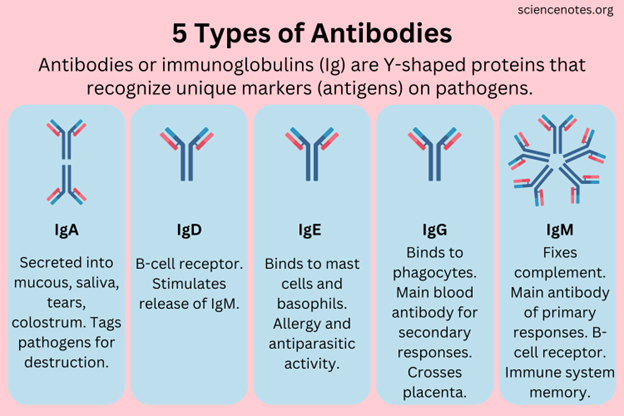Which immunoglobulin provides the most protection against Infection in a client, as it is the most abundant?
IgG
IgE
IgM
IgA
The Correct Answer is A
A. IgG: Immunoglobulin G (IgG) is the most abundant antibody in the bloodstream and represents about 75% of all the antibodies in the body. It provides long-term immunity because it can persist in the bloodstream for a long time. IgG antibodies are involved in secondary immune responses and are capable of crossing the placenta, providing passive immunity to newborns.
B. IgE: Immunoglobulin E (IgE) is associated mainly with allergic reactions. When the body is exposed to an allergen, it triggers the release of IgE, leading to the symptoms of an allergic response, such as sneezing or itching.
C. IgM: Immunoglobulin M (IgM) is the largest antibody and is usually the first antibody produced during an initial exposure to an antigen. It is particularly effective at agglutination (clumping together) of pathogens.
D. IgA: Immunoglobulin A (IgA) is found in high concentrations in mucous membranes, particularly those lining the respiratory passages and gastrointestinal tract. It provides localized defense against pathogens. IgA antibodies are also found in saliva, tears, and breast milk, providing immunity to infants.

Nursing Test Bank
Naxlex Comprehensive Predictor Exams
Related Questions
Correct Answer is A
Explanation
A. Most type-1 reactions are allergic: This statement is accurate. Type-1 hypersensitivity reactions are typically associated with allergies. When a person is exposed to a specific allergen (like pollen or certain foods), their immune system overreacts, leading to various symptoms, from mild to severe.
B. It is mediated by IgA: This statement is incorrect. Type-1 hypersensitivity reactions are primarily mediated by immunoglobulin E (IgE) antibodies. When these antibodies bind to allergens, they trigger the release of histamine and other chemicals, causing allergic symptoms.
C. It never contributes to autoimmune diseases: This statement is incorrect. While type-1 hypersensitivity reactions are often associated with allergies, they are distinct from autoimmune diseases. In autoimmune diseases, the immune system mistakenly attacks the body's own cells and tissues, which is a different mechanism from hypersensitivity reactions.
D. Most occur against medications: This statement is not entirely accurate. While some type-1 hypersensitivity reactions can be triggered by medications (like penicillin), they can also be caused by various other allergens such as pollen, animal dander, insect venom, and certain foods. The prevalence of medication-induced type-1 reactions varies, and it's not accurate to say that most occur against medications.
Correct Answer is B
Explanation
A. "You have developed urticaria in response to something in your environment."
This statement is incorrect. Urticaria refers to hives, a skin rash usually caused by an allergic reaction, infection, or stress. It's not necessarily indicative of an autoimmune disease.
B. "Your immune system is creating antibodies that are destroying your own cells."
This statement is correct. Autoimmune diseases involve the immune system mistakenly attacking the body's own cells and tissues, leading to various health issues.
C. "Your immune system is not able to create antibodies to help you fight infection."
This statement is incorrect. In autoimmune diseases, the immune system is overactive, producing antibodies that target the body's own cells, not that it can't create antibodies.
D. "You have developed an infection that is destroying your immune cells."
This statement is incorrect. Infections don't typically destroy immune cells; instead, infections often stimulate the immune system to respond and fight against invading pathogens.
Whether you are a student looking to ace your exams or a practicing nurse seeking to enhance your expertise , our nursing education contents will empower you with the confidence and competence to make a difference in the lives of patients and become a respected leader in the healthcare field.
Visit Naxlex, invest in your future and unlock endless possibilities with our unparalleled nursing education contents today
Report Wrong Answer on the Current Question
Do you disagree with the answer? If yes, what is your expected answer? Explain.
Kindly be descriptive with the issue you are facing.
